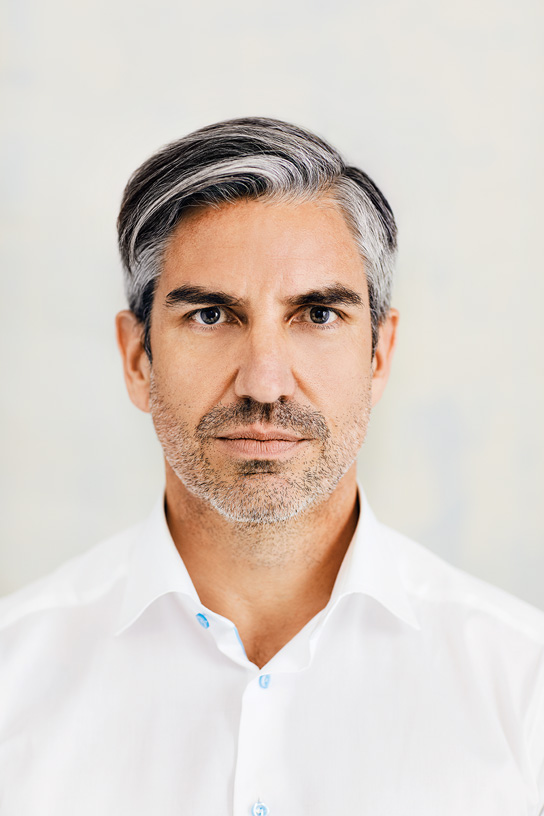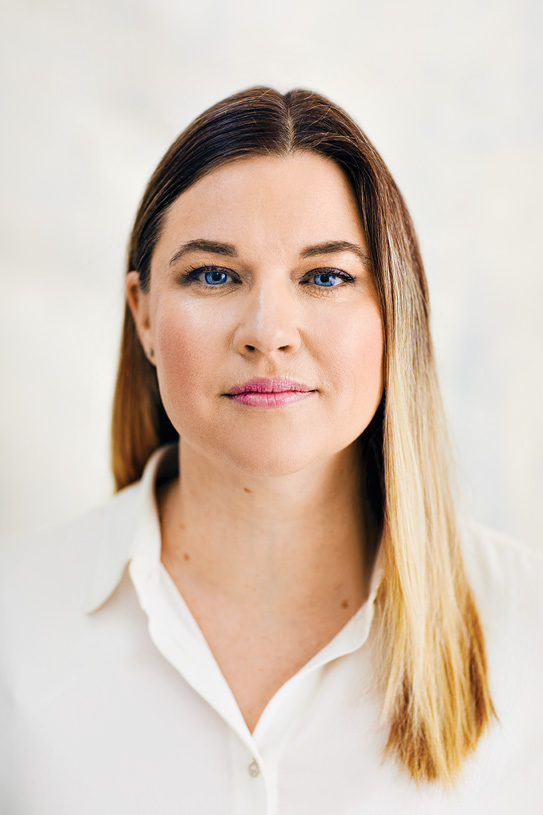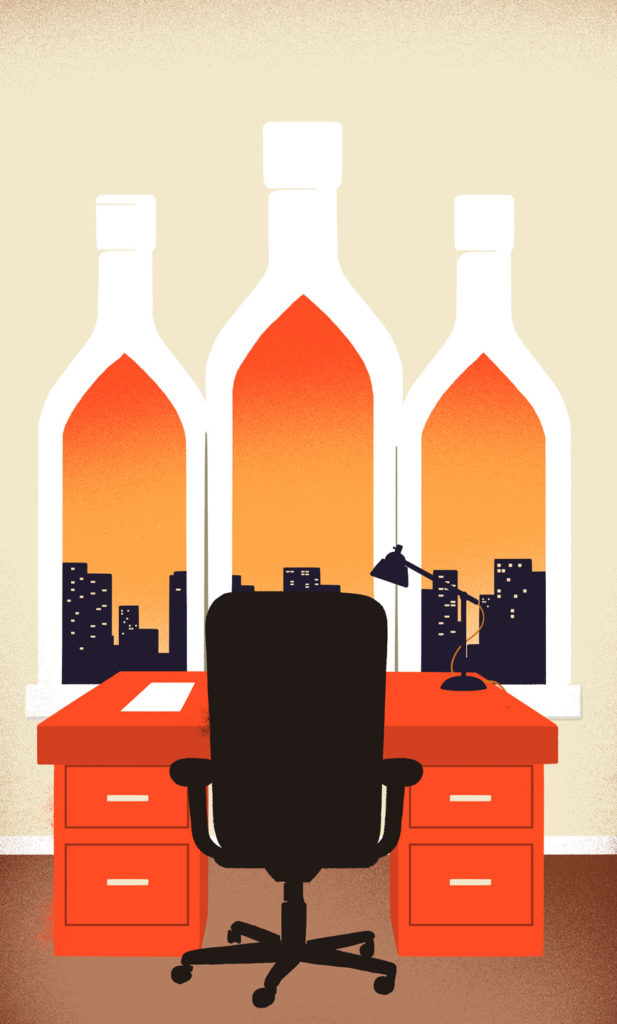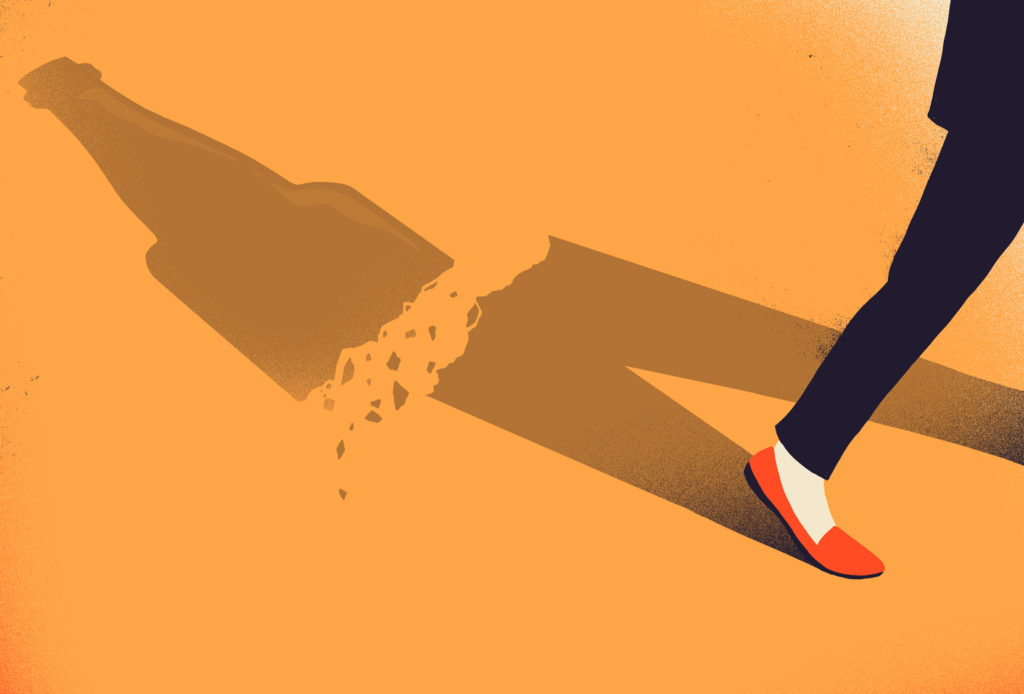Part One: Crashing
On a Monday morning in July of 2015, David Whitten arrived at his office. He had a full slate of meetings in his calendar. He also had a crippling hangover. “I decided I had to go home for the day,” he recalls. “For the first time in my career, I wasn’t capable of meeting my obligations.”
At 41, Whitten was astonishingly high functioning. He was the co-founder of Whitten & Lublin, one of the top employment boutiques in the city. And in person, he was also a consummate professional: confident and gregarious. The sort of person who could mingle with colleagues or put clients at ease at painful moments in their careers.
He was also a long-time heavy drinker. “I would describe myself as a weekend warrior,” he says. “I never blacked out, drank and drove or had any criminal behaviour. But come Friday night, I was the first one to grab a cocktail.”
He had come to rely on alcohol to weather the strains of life. “I didn’t know any other way to relax,” he says. “And when I promised myself I’d only go out for two beers, I couldn’t. There are people who can leave a half-full glass of wine on the table and walk away. I was the guy who couldn’t leave a drop behind.” As long as his career prospered, he had no difficulty justifying the amount that he drank. “I would think to myself, I work hard, and I party hard.”
But to leave work because of a hangover? That was impossible to dismiss as harmless. “It really scared me,” says Whitten. He knew he had to face the problem.
One decade earlier, Catherine Keyes knew she had made a mistake. At the time, she was an articling student at Cassels Brock & Blackwell LLP. “A senior partner had invited me to an 8:30 meeting with a client,” she recalls. “But I’d gotten bombed the night before and slept through the meeting.” When she apologized to the partner, he told her not to worry. “But I’m pretty sure he didn’t mean it. He never called me for anything else again.”
At 29, she was drinking on an almost-daily basis. “If I wasn’t drinking,” she recalls, “I was thinking about it. Where am I going to go out drinking? Who will I go out with?”
At every stage of her academic career — in high school, university and law school — alcohol had been a central part of her identity. To the outside world, she was a terrific party companion: fun and outgoing. Her drinking never seemed to impede her performance as a student. Nor did it prevent her from landing on Bay Street. On paper, she was a resounding success.
But during her articling term, Keyes was unable to deny the harsh truth: alcohol was starting to interfere with her plans for the future. There was, for instance, the client meeting she had missed that one morning. But there had also been other minor work-related mistakes that she attributed to irresponsible drinking. “I didn’t know what life would be like without alcohol,” she says. “But I couldn’t do it anymore. I had to leave it behind. I had to stop.”
Part Two: Origin Stories

“I’d tell myself that I don’t have an issue with alcohol because I’m succeeding,” says David Whitten.
As a child, Whitten was a class clown. “I was precocious, but a trouble maker,” he says. “I had a short attention span. I was always cracking jokes in class, trying to be the centre of attention.”
His teachers were divided on whether he deserved their attention. “They either loved me and wanted to help me progress in a non-disturbing manner, or they wanted nothing to do with me,” says Whitten, who spent most of his childhood in Hamilton. “There was rarely an in-between.” A common joke among the staff was that “he’d either be a lawyer or he’d end up in jail.”
Throughout his life, Whitten has struggled with perfectionism. “In a lot of ways, I was an anxious kid,” he says. “As an adult, I’ve also had issues with anxiety. It’s always been related to the fact that I hold myself to a standard of perfection. And it’s simply unattainable. It’s not possible for humans to be perfect. And yet, I have this idea in my head that I have to prove the world wrong.”
Over time, he realized alcohol could ease his anxiety. At nine years old, he took his first drink. “I was with a friend of mine,” he recalls. “His older brother had left some beers behind. I remember this euphoric feeling. The clouds in the sky opened up.”
He didn’t touch alcohol again until he was a teenager. “It’s a typical story,” says Whitten. “I was about 13, hanging out with a friend. We grabbed a bottle from his liquor cabinet, and we got hammered.” The substance, once again, brought on “a feeling of euphoria,” as his concerns and anxieties seemed to melt away.
By high school, his relationship with alcohol became less typical. “I started to drink almost every time I was out and about,” says Whitten. Nothing else had the power to silence unwelcome thoughts with such brutal efficiency. “Alcohol was the perfect elixir. It was magic.”
Keyes was a studious, introverted child. “That made it hard to relate to people,” she says. “I didn’t know how to make friends.” In her teenage years, she discovered that alcohol was the perfect antidote to her social anxiety. “I realized that when I drank alcohol, I wasn’t introverted anymore. Then I was an extrovert. I was able to come out of my shell and become the person I wanted to be.” Her social network started to expand. “It was easy to meet other kids who were interested in partying. We had this commonality and something to do together.”
At one point, Keyes, who grew up in North York, dropped out of high school. “It wasn’t related to alcohol,” she says. “I had a lack of interest. I was bored.” Her parents took that decision in stride, instituting only one rule: “If I was in the house, I had to be doing something,” says Keyes. That led to a string of low-paying jobs: in telemarketing, retail, fast food. “After two years, I decided that wasn’t what I wanted to do for the rest of my life. Even though high school was boring, I had to get it done.”

“I didn’t know what life would be like without alcohol. But I couldn’t do it anymore. I had to leave it behind,” says Catherine Keyes.
And she did. After graduation, Keyes studied criminology at the University of Toronto. “As a high-school partier and dropout, I was exposed to youth who were angry and getting in trouble,” she says. “I had a lot of sympathy for that. I wanted to help youth who were in trouble with the law.”
Her infatuation with alcohol never abated. “I remember my undergrad as a lot of fun,” she says. “I worked; I played hard. There was a lot of binge drinking, but it didn’t get me into trouble. I wasn’t getting drunk before a big test. I was able to manage it. I also did really well. I graduated with high distinction.”
In 2001, Keyes entered law school at the University of Toronto. Though she had once hoped to join the world of criminal defence, the campus-wide fixation on Bay Street captured her attention. Her anxiety, in turn, reached a brutal new height. “The pressure was overwhelming,” she says. “We were all driven to get in line for the best jobs. We weren’t competitive or cruel; we were all happy to share notes. But the fear of failure was huge. It was also hard not to be the best of the best. I had always been a high achiever.”
Keyes attended class, completed her readings and attained high marks, but she was unable to shake these feelings of inferiority. And she turned to alcohol to manage those emotions. “I would drink a lot of beer and wine, either in pubs or at home with friends,” she says. “I found the other law students who drank a lot, but if they weren’t drinking, that was no problem. I’m from Toronto, so I could navigate through friend groups and drink most days of the week.”
Alcohol, at its core, is a depressant. Although it has a small effect on the reward centre of the brain, its primary function is to slow our mental software to a crawl. Motor skills decline, alongside the mind’s capacity to handle complex thoughts, concentrate on discrete tasks or stay alert to potential dangers. As alcohol invades the brain, in other words, it turns down the volume.
In the throes of anxiety, by contrast, the mind has been thrust into overdrive. If you can’t stop obsessing about a trial that’s set to start in six months, for instance, you’re fixating on a future event that should not be an immediate priority. By dampening your ability to process such long-term concerns, alcohol can, in effect, quiet down the anxious mind. That calming effect can be bliss.
In the long term, however, it’s self-destructive to anesthetize anxiety with alcohol. For one thing, the brain can build up a tolerance to the substance, so an ever-increasing amount may be required to achieve the same relief. “You’re also not dealing with the underlying problem,” says Doron Gold, a staff clinician at Homewood Health, which runs the member-assistance program for the Ontario legal profession. “Drinking to alleviate anxiety is a bit like walking around with a broken leg and taking Percocet to avoid the pain.”
In Gold’s view, the evolution of a drinking problem tends to begin as a benign act of experimentation. Think of the 13-year-old Whitten cracking open his friend’s parents’ liquor cabinet. “You’re young,” says Gold. “And you’re curious.” It’s not the wisest choice, but it’s not a disorder.
Alcohol consumption then becomes recreational. “It’s like having chocolate for dessert,” says Gold. “It’s a nice thing to have in life, and it’s not harmful in any meaningful way.” Most adults inhabit this stage of drinking for their entire life. Sure, there might be the occasional hangover, but to drink in moderation — at dinner parties and among friends — is no cause for alarm.
The next stop on the road to problem drinking is self-medication. “If you’re using alcohol to take the edge off your anxiety or to calm the pain you feel from a traumatic memory, it’s as though you’re using it as medicine,” says Gold. “To drink in order to feel less unhappy is a maladaptive coping mechanism.”
In the final phase of a drinking problem, alcohol has become a necessity. “You’ve become dependent,” says Gold. “It feels like you need the substance to get through the day or the week.”
His definition is intentionally broad. It’s more expansive, for instance, than the common understanding of clinical dependency; in this condition, an individual needs alcohol to prevent the body from going into physical withdrawal. Meanwhile, someone with an addiction prioritizes alcohol above everything else in life: work, family, friendships. To Gold, however, drinking is harmful well before someone acquires a full-blown clinical dependency or addiction. If someone is unable to deal with the difficulties of life — workplace stress, trauma, insomnia, emotional distress — without alcohol, it’s a problem.
In 1993, Whitten became a student at the University of Toronto in the school’s faculty of political science. He remained a hard-working heavy drinker. “In later high school, the candle was lit,” he says. “By the end of my undergrad, the fireplace was in full burn.”
But his performance as a student never seemed to decline. After graduation, he went to law school at the University of Windsor, where he was one of the few to land a job on Bay Street, summering and articling at Miller Thomson LLP. He was hired back, but, after about three years as an associate at the firm, he left. “I didn’t love big-firm culture,” he says. “I also discovered that I enjoyed employment law, and that opportunity wasn’t available.”
To Whitten, employment law was a feel-good practice area. “You have an opportunity to help someone with something personal,” he says. “The hours are pretty good, too. People generally get hired and fired between 9 to 5, so we don’t take too many after-hours calls. And since you’re fighting over money, you also get paid.” He moved out of Big Law and into an employment boutique.
Five years later, Daniel Lublin, a solo employment lawyer, approached Whitten with the idea to launch their own firm. “Ultimately, I thought I might as well take a swing at it,” says Whitten, who had briefly worked with Lublin at the boutique firm. By this time, he was married. “My wife was a lawyer, so I didn’t have to worry about keeping the lights on. I also knew that I had some client-development skills.” His partnership with Lublin flourished. Through mutual support, both lawyers have built an elite practice. The firm has argued major cases that have shaped modern employment law. And both partners are experts in the media, regularly appearing on the radio and in newspapers. “It’s been incredible,” says Whitten. “We have 12 lawyers now, and we’re at the top of our field.”
None of these triumphs alleviated his perfectionism. “If you’re fortunate enough to have success,” he says, “you start to stress about whether you’re going to be able to maintain it.” Despite mountains of evidence to the contrary, he worried that he was somehow failing to live up to his potential — or that he was unable to represent his clients to the best of his ability. Only after a few drinks would his mind relax. “I wouldn’t think about work at all,” he says. “That’s because I was intoxicated.”
Whitten found it easy to shrug away his drinking. “I’d tell myself that I don’t have an issue with alcohol because I’m succeeding,” he says. “Because I don’t drink during the day, or heavily on weeknights. Because I can go an entire week without drinking. Because I’m still married and have a nice life.” Those excuses didn’t last forever.
Part Three: Blame

How common is alcohol abuse in the legal profession? That’s a difficult question to answer with authority. In Canada, there’s simply no data. In the United States, where the legal culture most resembles our own, two major studies exist. In 1990, the International Journal of Law and Psychiatry surveyed close to 1,200 lawyers in Washington State. It found that 18 percent of respondents were problem drinkers. Among highly educated professionals, by contrast, this number sits at around 12 percent. Lawyers, it seems, were at a higher risk.
In 2016, the American Society of Addiction Medicine conducted a new study on this topic. In email interviews with lawyers across the United States, the organization asked a series of questions about alcohol use. Some focused on how much a lawyer drinks (“How often do you have six or more drinks on one occasion?”), the consequences of that consumption (“Have you or someone else been injured as a result of your drinking?”) and if there are symptoms of alcohol dependency (“How often during the last year have you needed a first drink in the morning to get yourself going after a heavy drinking session?”). In the end, 12,825 lawyers completed the survey, and close to 21 percent of those respondents screened for “hazardous, harmful, and potentially alcohol dependent drinking.”
How precisely these results would map onto the profession in Toronto is not clear. But it’s certainly sufficient to sound the alarm. “We don’t want to overstate the data,” says Ronit Dinovitzer, a sociology professor at the University of Toronto, and one of the few academics to study the legal profession in Canada and the United States on a full-time basis. “But we don’t have a lot on this topic. This is the best study we have right now.”
The legal workplace is lined with mental-health tripwires. Let’s start with the long hours. “If you’re working well into the evening, think of what that forces you to sacrifice,” says Patrick Krill, a lead author of the 2016 study on alcohol use in the American legal profession. “You’re not spending as much time with family and friends. You don’t have time to exercise. You’re probably not sleeping enough. That’s what makes long hours so toxic.”
Beyond those factors, there is a professional imperative to maintain a facade of invincibility. “There is this notion, and it’s beaten into us at law school, that we’re supposed to be on our game all the time,” says Krill. “We’re taught to put our humanity in the back seat.”
The fact that legal culture prizes the pursuit of perfection also places lawyers at risk. “The profession is very externally oriented,” says Derek LaCroix, the executive director of the Lawyers Assistance Program in British Columbia. “There is a tendency to build our identity around grades, articling positions and big cases. We can lose sight of our internal purpose and drift off course.”
The full list of stressors in the legal profession is almost endless. It could include the sky-high levels of student debt, not to mention the pressure to meet an ever-growing billable-hour quota. “All of these factors can lead to mental-health issues,” says Krill. “That, in turn, can cause lawyers to self-medicate.”
Which brings us to alcohol: a time-honoured, profession-sanctioned release valve. “Alcohol is used for almost everything,” says Krill. “To celebrate wins. Mourn losses. Build social capital.”
So, yes, the legal profession bears some responsibility for the high levels of problem drinking among its ranks. But to give credit where it’s due, reform is afoot. At law-firm cocktail parties, for instance, non-alcoholic options are increasingly available. Most Canadian law schools, meanwhile, now employ full-time mental-health-counsellors. These are promising signs that the profession is moving in a positive direction.
It’s also an oversimplification to single out law-firm culture and lay the blame entirely at its feet. Consider the role that drinking plays in broader society. “We’re bombarded with the message that alcohol is the answer,” says Samantha Wells, the senior director of the Institute for Mental Health Policy Research at CAMH. “How many movies and images do you see of someone throwing back a drink to relieve tension and stress at the end of the day? These often have an impact. We have forgotten, as a society, that alcohol is a drug. We have decided that it’s an innocuous substance that helps us celebrate milestones and relieve stress.”
Brian Cuban, a former lawyer based in Dallas, is the author of The Addicted Lawyer. The book is primarily a memoir of his own experience with cocaine and alcohol addiction, as well as bulimia. But he also writes about how other lawyers and law students have overcome substance abuse and, today, live in recovery.
For Cuban, whose brother is the well-known American billionaire Mark Cuban, the profession must re-evaluate its relationship with alcohol. One of his concerns is the omnipresence of alcohol at law-firm events. (His solution: “All events should be ticketed. There should never be an open bar.”) He also thinks that law firms need to valorize human connection as much as professional performance. “The law profession is about achievement,” he says. “If that’s our only focus, it can forestall connection with the people around us. We need to support each other.”
But he’s careful not to attribute the high rate of alcohol abuse among lawyers solely to legal culture. His own story of addiction, for instance, is linked to body-image issues that he experienced in childhood. “I was drinking to numb self-hatred,” he says. “It was based on my inability to deal with long-standing trauma. I was trying to bring myself up with cocaine and numb those feelings with alcohol.”
Addiction narratives are, in a word, complex. “In my anecdotal experience, not many lawyers are tipping over to problem drinking solely based on stress,” says Cuban. “There are almost always other underlying issues that haven’t been dealt with.”
There’s a distinct possibility that people who are prone to alcohol abuse are drawn to the legal profession. Those who struggle with anxiety might, indeed, drink to alleviate their mental angst. But they might also seek out a career in a prestigious profession— such as law, for instance — hoping to bolster their confidence and quiet their self-doubt.
Among his clients at Homewood Health, Gold has certainly noticed this tendency. “There are a lot of people in the legal profession who come from that ‘not good enough’ place,” he says. “They are always pushing further and further to prove their worth. And their worth is tied to what they do, as opposed to who they are.”

Consider the career story of LaCroix. Though he’s been a full-time counsellor at the B.C. Lawyers Assistance Program for more than two decades, he’s also a lawyer in recovery for alcohol abuse. He was, first, a prosecutor, before he practised in the area of criminal defence. As a junior lawyer, he was a partier and a big spender. Behind that fun-loving veneer, he drank for a darker purpose. “There was a voice in my head that always said, You gotta do more. You didn’t do that right,” he recalls. “After a couple of doubles, the voice stopped. I just felt normal.”
LaCroix also recognizes that he became a lawyer — at least, in part — for the same reason he drank: to calm his anxious mind. “There were really only three career options that I ever considered,” he says. “Lawyer — which is what I mostly wanted to do — doctor or professor. I knew my job had to be high prestige.”
Whitten, too, sees a connection between his drinking and his decision to practise law. “There’s some co-relation,” he says. “I knew that I wanted to have a job that was highly valued in society. That was an attempt to feel better about myself, to quiet that voice deep down inside that says, You’re not good enough. You have to prove yourself to the world.”
Keyes went to law school with a pre-existing interest in criminal defence, but she also hoped it would boost her sense of self-worth. “I never felt like I was good enough, so I always wanted to prove myself,” she says. “Becoming a lawyer was part of that. I wanted to do very well.”
Taken together, these strikingly similar testimonies could help to explain the high rate of problem drinking in the legal world. The tragedy, however, is that it’s not possible to resolve inner turmoil through career achievement. “You can’t seek external validation for the quality of a human being you are,” says Gold. “Even periodic successes are fleeting. You’re always running, always chasing.”
Part Four: Takeover
Alcohol is a cunning villain. At the beginning of a drinking problem, the real-world consequences are often hidden from view. “But from the get-go, there’s a metre running,” says Stephen Wells, who runs Sober Elite, an addiction and mental-health counselling service for affluent-sector professionals. “You just might not see it, because the consequences of alcohol fly under the radar.”
Sure, you slept on the floor that one night, but you managed to get to work on time in the morning. “Alcohol is a rapacious creditor,” says Wells. Eventually, it will collect.
By 2014, Whitten recognized that he could no longer control his alcohol intake. “Earlier in my career, I could go out for a couple of beers, then come home and that would be it,” he says. “It got to a point where, once I started drinking, I couldn’t stop until I reached a state of high intoxication.”
His drinking was also starting to have a negative impact on his life. “Around that time, my marriage fell apart,” he says. “I was married for 16 years to a great person. There were a number of reasons that led to the downfall of the marriage, but, if I’m going to be fair, drinking was one of them. Over time, I wasn’t as present as I could be for my spouse. Rather than dealing with tough issues that we had to discuss, I was turning to the bottle.” There were occasions when, instead of going home to spend time with his wife, he would stay out to have a couple more drinks. “My priorities shifted imperceptibly along the way. The alcohol had become this yoke around my neck.”
In November of 2014, Whitten successfully took a one-month break from drinking. “But once December arrived,” he says, “I came in hot.” He continued to drink over the next six months, until, one morning, he arrived at work with a brutal hangover. That’s when he knew it: he had to stop drinking.
During the autumn semester of her second year of law school, Keyes went to the Addiction Research Foundation. (She can’t remember what precipitated this decision.) Their medical recommendation was clear: that she leave school and enter a month-long treatment facility.
That option was out of the question. First, Keyes wasn’t ready to turn her back on alcohol. And second, she thought it would destroy her legal career. “There’s no way I was going to take time off law school and have to repeat my year,” she says. “I didn’t feel that the legal profession would forgive me.”
And so: she went back to her life of heavy drinking. As Keyes looks back on this period in her life, the memories are scattered, the exact narrative difficult to pin down. “I was blacked out a lot,” she says. “I call it the dark days.”
Alcohol’s impact on our memory is profound. Once our blood-alcohol level reaches double the legal driving limit, the region in the brain that captures and catalogues memories starts to stall. In many cases, this can cause a blackout. At this level of inebriation, the rest of the brain might chug along, enabling the body itself to continue partying. But come morning, there might not be any mental record of what transpired during the previous day’s bout of drinking. “It’s terrifying,” says Keyes. “I’d wake up in the morning and look around. Okay, good, I’m at my house. I still have my arms and legs — that’s good. No one else is here — thank God. I’m even getting choked up thinking about it, because I lived like that for a while.”
Neither her schoolwork nor her career seemed to suffer. And yet, even as she landed summer and articling positions at Cassels, her fear of failure persisted. “Once I had the job,” says Keyes, “the imposter syndrome kicked in. When are they going to find out that they hired the wrong person? When will they find out that I’m not going to be a real lawyer?”
Through the Addiction Research Foundation, Keyes was seeing a psychiatrist, who had prescribed medication for both depression and anxiety. But throughout her time as an articling student, alcohol remained both a necessity and an increasingly destructive force. It caused her, for instance, to sleep through that client meeting one morning. And she also appeared at a non-contested motion totally unprepared; she had gone drinking the night before. “There was no impact, since it was non-contested,” she says. “But I was starting to feel that drinking was getting in the way.”
Near the end of articling, something in her mind clicked: she had to stop drinking. “It was the realization that I couldn’t get to where I wanted to be and have alcohol,” she says. “For a long time, alcohol was a great solution. Eventually, it turned on me.”
Part Five: Recovery
On July 15, 2005, Keyes abandoned alcohol forever. One week later, she was called to the bar. “I’ve never taken a drink as a working lawyer,” she says. But the road to sobriety was difficult.
Keyes had to manage feelings that, for more than a decade, she had drunk into oblivion. “I’d never had to deal with anything without alcohol,” she says. “I was an adult, with an adult job, but I hadn’t matured. I had zero coping mechanisms. I was essentially a high-school kid in an adult’s body.”
To develop an emotional skill set, she needed help. So she started to attend regular meetings at a 12-step program. And she saw a therapist. “We talked through my whole life,” she says. Over time, her anxiety and depression lifted; she no longer takes medication for either condition.
After her articling term, Keyes was hired back at Cassels. Her one-time passion for criminal law had subsided. “Once I started to learn about other areas of law, criminal law started to seem too intense for me,” she says. “I decided to go in the corporate direction.”
In 2008, after three years as a large-firm associate, she moved to a litigation boutique. Around this time, she got married and started a family. After the birth of her second child, she found the demands of private practice too onerous. In 2014, she moved in-house to TD Bank. “My primary role is to provide legal support and advice to TD on a broad variety of investigations. I also lead the e-discovery team and assist in the management of litigation risk and litigation against the bank. Overall, I’m super happy with my career,” she says. “In my spare time, I am pursuing an LLM in privacy and cybersecurity at Osgoode. And I am raising two beautiful and engaging children.”
Today, Keyes has a calm, self-assured presence. As she recalls the darkest moments of her past, in a small meeting room at the bank, she’s almost nonchalant. It’s been so long, after all, since alcohol maintained such a tight grip on her life. “In that first year of sobriety, there was a lot of fear that I would pick up a drink,” she says. “But now, it’s just not on my list of coping mechanisms. There is no problem that alcohol won’t make worse.”

“I have been far more successful since I quit drinking than I was before,” says David Whitten.
On July 16, 2015, Whitten quit drinking. “My path to sobriety was a slow burn,” he says. He, too, sought help, through therapy and addiction counselling. He took a deep dive into why he drank in the first place. “I had to accept myself for who I was.”
For Whitten, abstinence was the only solution. “I know that I can never drink again,” he says. “When someone asks me, ‘Are you sure you don’t want one beer?,’ I’m like, ‘I don’t want one; I want the case.’ I just don’t see the point in having one beer. I never have. That will never leave me.”
A few months into his recovery, he had a profound experience. “It was a beautiful day; the sun was on my face,” he recalls. “This sounds cheesy, but I noticed a bird chirping. I thought, Wow, that’s really kind of sweet. I feel really good now. The clouds were starting to open.”
In conversation today, Whitten has a lively personality. Sitting on a couch in his light-filled office, he’s outgoing and animated. It’s easy to imagine him making new friends with ease. And yet, for most of his working life, he had convinced himself that, to make connections, he had to drink. “That was a crock of shit,” he says. “I have been far more successful since I quit drinking than I was before. The way you connect with people is by being sincere and authentic, not by getting wasted with them. I can tell you, with four years of sobriety under my belt, my relationships with clients are stronger than ever. So are my relationships with other lawyers.”
Once he stopped drinking, he saw his social circle in a new light. “Those wasted connections I made over time were wafer thin,” he says. “I would connect with lawyers and clients who were heavy drinkers because we could go out on the town and rip it up with no guilt or shame. You fool yourself into thinking it’s normal. I got to a certain stage when I didn’t even feel comfortable with people who didn’t drink. I didn’t trust them. I thought they were too straight for me or didn’t know how to let their hair down. That was just ridiculous. I only thought that to justify my own drinking.”
Because he gave up alcohol around the time that he became newly single, he worried about re-entering the dating scene. “I wondered, Am I actually going to be able to meet somebody?” he says. “Initially, I was very self-conscious. But as I got more comfortable with it, so were the people I was with.”
Eventually, he started a new relationship. This past summer, he remarried. “My spouse is a normal drinker,” he says. “I think she appreciates the fact that I’m never going to be the guy out there getting wasted and not getting back on time.”
To other lawyers who might be suffering at the hands of alcohol abuse, Whitten has the following message: “Don’t be ashamed. Inevitably, alcohol causes you to do and say things you’re not proud of. Then you self-flagellate. And then you drink more to get rid of that shame. The first step is to forgive yourself.” The next step is to get help. “It sounds so cliché, but, if you feel you have a problem with alcohol, you’re not alone.”
This story is from our Spring 2020 Issue.
Photography by Nick Wong. Illustrations by Sébastien Thibault.


